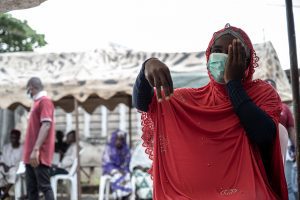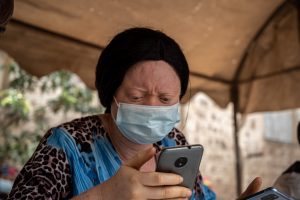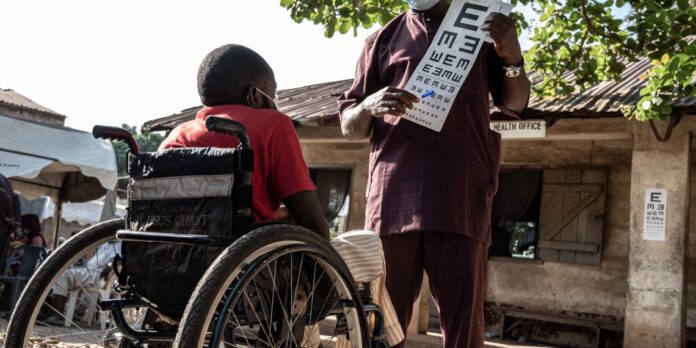Civil society leaders recently announced that 95% of Nigeria’s healthcare facilities are inaccessible to people with disabilities, but two innovative healthcare projects, implemented by Sightsavers, are working with organisations of persons with disabilities to change this.
In Nigeria, there are over 25 million people with disabilities (PWDs), and it is estimated that nine out of ten live in poverty. Quality healthcare is often unaffordable or inaccessible for many, from buildings that are hard to navigate to patients with disabilities facing discrimination and marginalisation.
To address these challenges, the Inclusive Futures programme, implemented by Sightsavers, has been working with the government and disability organisations to make eye health services more inclusive.
The programme, supported by players of the People’s Postcode Lottery and the UK’s Foreign Commonwealth Development Office, has resulted in the renovation of two public hospitals in the Federal Capital Territory and three hospitals in Kogi State, as well as COVID-19 treatment facilities. They have also convinced the state to reduce the cost of eye health surgeries for people with disabilities, who now only pay a third of the usual cost.
It has also had implications at a national level, as it has resulted in the joint creation of National Accessibility Standards by Sightsavers and the National Commission for Persons with Disabilities (NCPWD). These are due to be published this year, ahead of the launch of the government’s Accessibility Minimum Standard Policy in January 2024, when all public buildings in Nigeria must be made accessible for persons with disabilities or face being fined.
Joshua Omojo Ibenu Sightsavers’ eye health programme officer, said “We work in a number of areas, from making facilities more accessible to training health workers on inclusive working. And more complex behaviour change challenges stigma and discrimination around disability.”
Ibenu also noted that 354 healthcare staff had been trained on disability awareness, gender equity, sign language, and collecting disability disaggregated data. Ibenu points out that this training is vital because “you can have all the facilities in check, but if your attitude and behaviour are not good, people will not seek healthcare there”.
Salami Onubaiye, an ophthalmic nurse who was one of the trainees says it taught him how to include people with disabilities in healthcare and to understand what barriers they face. He says the outreach is done as a result “it creates an awareness for [people with disabilities] to know that there are facilities here for them…we are able to identify with them. They now feel [they] belong to health facilities”.

Facilities have been made accessible using a toolkit designed by Sightsavers; the accessibility standards and audit pack, which can be easily used to audit and modify existing health infrastructure.
Another significant aspect of the projects is that representatives of organisations for people with disabilities (OPDs) directly control the work by sitting on the steering committee of the programme. No decisions can be made without their input. To ensure diversity of representation, research and workshops were run to engage OPDs from national levels right down to the district and to include those run by women and with a range of impairments.
Ocheni Victoria Iye of The Albino Foundation (TAF) Nigeria, is one of the steering committee members and says that they “plan the project, the work, together” and that everyone plays a role in advocacy and data collection.
Ocheni adds, “during this project, I was able to meet more persons with disabilities. I’ve been able to work with all, the deaf, the blind, the physically impaired…I think that has been life-changing for me”.

She says to policymakers, “You must involve us, if you are designing a policy and the person with a disability is not there, you have not done anything”.
Dr Adebukola Adebayo, an independent disability rights & inclusive development expert says, “I’ve been involved in evidence-based advocacy work for many years and this is the first time I’ve seen a co-creative approach with both supply-side actors and people with disabilities working together to see what the barriers and the gaps are.
“The engagement of health workers in the process has provided a rare first-hand opportunity and exposed them to inclusion and accessibility in a way that has never been done before in Nigeria.”
He adds that the new way of working “will make it more sustainable for policy-makers and government to work with civil society to solve inclusion problems. They can understand that they need to work with people with disabilities themselves, that is essential. It is very far-ranging.”


